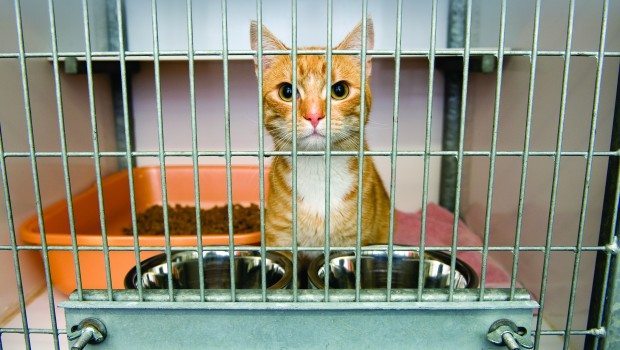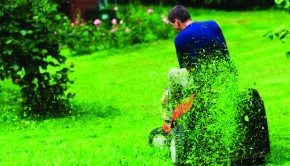Saving Animals Saves People
Rescue You, Rescue Me
Like water, grace seeks its own level. In rescuing animals, the rescuer is often also rescued. Both lives change for the better.
“Buster came to us for a reason,” says Amy Burkert. “My husband, Rod, and I were walking our Shar-Pei, Ty, in our Philadelphia neighborhood when a man warned us about ‘a big, black dog’ in the alley. The friendly fellow came home with us and after a fruitless search for his family, we decided to make him part of ours.”
In 2009, when the couple encountered difficulty finding a vacation hotel that would accept their new 70-pound German shepherd as an overnight guest, they decided to launch GoPetFriendly.com, a website that assists in finding travel accommodations for families with dogs and other pets. Selling their house in Pennsylvania and hitting the road in a 24-foot-long RV, they’ve now traveled to 47 states to research and qualify content for the website; Rod works from “home” and Amy writes the weblog. Their travel schedule flexes, with most stops lasting one to three weeks.
“It’s not the life two accountants were banking on, but we couldn’t be happier,” she says, “and we owe it all to Buster.” The site now lists more than 60,000 hotels, campgrounds, restaurants, beaches, dog parks and activities across the U.S. and Canada, plus a road trip planner.
“I woke up one morning and thought, ‘I can’t find a husband, so I’ll get a dog,’” says BJ Gallagher, a sociologist and award-winning author. “I’d lived in my Los Angeles house for 16 years and knew none of the neighbors. Within six months of adopting Fannie from a shelter, I’d met them all. Thanks to her, I’ve become a full-fledged member of my community.” Fannie’s Chinese heritage includes chow and Pekingese breeds.
Transformations can come from more unusual pets, as well. Soon after Susan M. Tellem, a registered nurse in Malibu, California, gifted her husband, Marshall, with two tortoises for his birthday, the couple discovered there was no national protection program for the reptiles. They started American Tortoise Rescue (Tortoise.com), an organization that has been rescuing, rehabilitating and providing sanctuary to more than 3,000 water turtles and land tortoises since 1990. Their education and awareness initiatives for humane treatment have gone international, as well.
It was a bird that rescued April Leffingwell. She had been dealing with a severe back injury that necessitated pain medication and kept her from regular work for six months when she and her husband visited a local Los Angeles pet store, “to get out of the house.” She was touched by seeing a large Moluccan cockatoo that was afflicted with a damaged claw. Her husband recognized how she related to the bird’s condition and brought Izzi home the next day.
Now with just one leg, Izzi has learned to sleep while lying down to rest his other limb. “Izzi and I found each other when we were both broken,” she says. “We’ve become each other’s source of strength. If he can live with only one leg, I can live through pain.”
When members of the armed forces deploy, they often have to find alternate living arrangements for pets and may not always be successful. Kimberly Gauthier, a blogger at KeepTheTailWagging.com, and her ex-Army partner are securing funding and laying plans to foster dogs for deployed soldiers. Emailing updates and Skype visits will aim to boost the morale of both the dog and serviceman or woman. The couple lives on five acres in Marysville, Washington.
An animal-enriched environment has proved to be helpful for author Kathy Rowe, a 20-year veteran retired from the military, and her husband, Scott, who also retired from Air Force service that included Special Forces duty. They have chosen to live on a 100-acre farm in Tyner, Kentucky. Kathy believes their variety of resident rescued animals, including dogs, cats, chickens, turkeys and a potbelly pig, all help Scott in dealing with post-traumatic stress disorder.
Riding, working with and grooming his horse, Quint, is particularly helpful. “My husband is less frustrated, has better focus, is less jumpy and has fewer flashbacks than he used to,” relates Rowe. “Knowing that our rescue dog, Lola, is guarding the farm, he feels he can sleep better because she has his back.”
Humans rescue animals, but animals show up for a reason—most humans can use some rescuing, as well.
<












